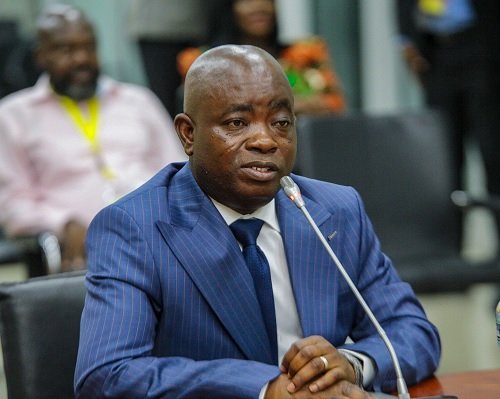News
US Ambassador stunned by 10% tariff on cocoa – Deputy Trade Minister

Deputy Minister of Trade and Industry, Sampson Ahi, has revealed that United States Ambassador to Ghana, was left surprised and concerned over the recent 10% tariff slapped on Ghana’s cocoa exports by President Trump.
Speaking on Joy News’ PM Express on Monday, April 7, the Bodi MP disclosed that the tariff issue came up during a meeting with Ambassador Virginia Palmer earlier in the day.
The discussion was prompted by what the Ghanaian delegation views as an unfair imposition of trade restrictions on a commodity the US does not even produce.
“Again, we asked why,” Mr Ahi told Evans Mensah during the interview.
“Because if you want to impose taxes on commodities to remain competitive, you would do that based on the commodities that you have a competitive advantage over us. The US doesn’t produce cocoa, but they have slapped a 10% tariff on its exports.”
He continued, “We sought clarification, and the ambassador, too, was surprised. She felt that if we pursued it, a commodity like cocoa could be exempted from the 10% tariff.”
The introduction of the tariff by the Trump campaign, as part of a broader trade strategy targeting several foreign imports, has drawn sharp criticism from cocoa-producing nations, who argue that it directly affects their economic lifelines and undermines global efforts at equitable trade.
Ghana is one of the world’s top cocoa producers and relies heavily on the commodity for foreign exchange.
Any new barriers to the export of cocoa are likely to have significant implications for the country’s economy and the livelihoods of millions of cocoa farmers.
According to the Deputy Minister, Ambassador Palmer did not attempt to justify the tariff but instead recommended further engagement between Ghana and the US at a much higher diplomatic level.
“No, she suggested that we should have a higher platform for discussing this particular matter,” Mr Ahi noted.
“She thinks that we should engage at a higher level—that means bringing in the president at a top governmental level.”
“She didn’t understand why cocoa is included. They know that they don’t produce cocoa, and so that was stated clearly,” he added.
Ghana, along with other African cocoa-producing nations, is expected to collectively respond to the new tariff measures.
Sampson Ahi indicated that plans are underway for a continental dialogue under the African Continental Free Trade Area (AfCFTA) framework.
“Apart from that, we also know that as Africans, we have agreed to fight this collectively. And so on the 14th of this month, AfCFTA is organising a meeting with African trade ministers to look at this situation,” he stated.
Source: Myjoyonline.com
News
Prioritise affordable treatment of sickle cell treatment —Health Expert

Health experts have urged Ghana to prioritise affordable and accessible treatment for sickle cell disease (SCD) as advanced, but costly curative therapies remain out of reach.
SCD, an inherited blood disorder, affects about three in every 100 newborns in Ghana.
Globally, around 1,000 babies are born with the condition daily, with three-quarters in sub-Saharan Africa.
The disease causes severe complications including chronic pain, anaemia, infections, strokes and organ damage, often leading to shortened life expectancy.
In recent years, gene therapy has been developed as a potential cure.
However, its cost—running into millions of dollars per patient—makes it financially and technically inaccessible in Ghana.
According to Dr Lawrence Osei-Tutu, a Sickle Cell and Childhood Cancer Expert at the Komfo Anokye Teaching Hospital, “the country must instead focus on practical, lower-cost interventions such as hydroxyurea”, a decades-old cancer drug proven to reduce painful episodes, hospitalisation and life- threatening complications in SCD patients”.
Taken orally, the medicine improves red blood cell function and is considered safe and effective.
“Hydroxyurea therapy is as good as the cure and a low-hanging fruit to pluck, we must bring a cure to our sickle cell warriors, but do so sustainably.” he urged.
In a chat with The Spectator here, he said to create awareness on the disease, the expert noted that despite its benefits, “hydroxyurea is not widely accessible in Ghana.”
Stressing that, “many patients either cannot afford it or struggle with irregular supply through the health system.”
Moreover, he argued that scaling up access would provide immediate relief while the country builds the infrastructure, trains specialists and secures funding needed to support curative therapies in the future.
With an estimated 15,000 babies born with sickle cell disease annually in Ghana, Dr Osei Tutu cautioned that “failure to improve access to effective treatment will leave many patients vulnerable to preventable complications and early death.”
From Kingsley E. Hope, Kumasi
Join our WhatsApp Channel now!
https://whatsapp.com/channel/0029VbBElzjInlqHhl1aTU27
Hot!
Let’s reintroduce Cultural Studies to complement educational reforms — Tourism Minister

Madam Abla Dzifa Gomashie, the Minister of Tourism, Culture and Creative Arts, has emphasised the importance of reintroducing Cultural Studies in schools as part of Ghana’s broader educational reform agenda.
She said Cultural Studies would complement existing efforts to reposition Science, Technology, Engineering and Mathematics (STEM) and Technical Vocational Education and Training (TVET) to promote digital literacy and expand Creative Arts education.
Speaking at the 2025 Homowo Festival of the people of Ningo-Prampram, held on the theme: “Education: The Best Legacy for our Children,” Madam Gomashie said cultural education was critical to national identity and development.
She noted that the festival’s theme aligned with the Government’s vision to transform education in Ghana and encouraged the youth to embrace it not only as a means of personal development but also as a way of preserving traditional values.
These values, including patience, wisdom, and hard work, were at the core of the Homowo celebration, the Minister said.
“Cultural festivals like Homowo are vital instruments for strengthening cultural identity, preserving historical memory, and fostering national unity. Additionally, festivals serve as platforms for educating the youth through storytelling, music, dance, and other traditional practices, while also providing opportunities for community engagement.”
Madam Gomashie highlighted the strong foundation that Ghana’s tourism was built on, which included culture, traditions, and the creative industry, collectively contributing to over GH¢4.8 billion to the economy.
“Festivals give tourists reasons to visit our country. Therefore, with the right infrastructure and the development of all the domains, the sector can do more than what has been recorded,” she added.
Mr Sam Nartey George, the Member of Parliament for Ningo-Prampram and Minister of Communication, Digital Technology and Innovation, commended the community for their vibrant participation in the festival. He announced plans for the construction of a new nursing training school in Ningo, aimed at expanding access to healthcare education in the area.
Nene Osroagbo Djangmah XII, Paramount Chief of Great Ningo Traditional Area; King Dr Tackie Teiko Tsuru II, Ga Mantse; Nene Tetteh Wakah III, Paramount Chief of the Prampram Traditional Area; Prof. Odaifio Welentsi III, Paramount Chief of the Nungua Traditional Area; Naana Dugbakuwor Dugba II, Paramount Queen Mother of Great Ningo; and Mr. Elvis Afriyie Ankrah, Special Envoy on Religion and Inter-Faith Affairs, who represented the Chief of Staff, were among dignitaries at the festival. -GNA














